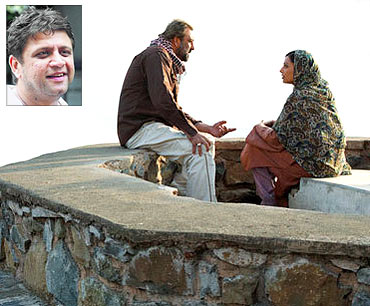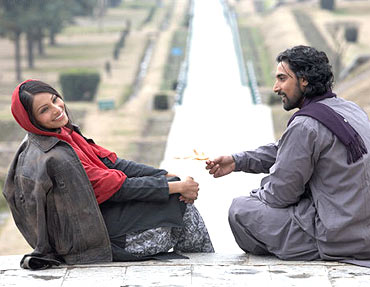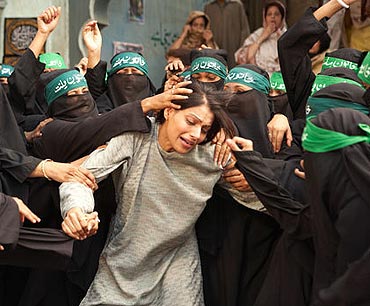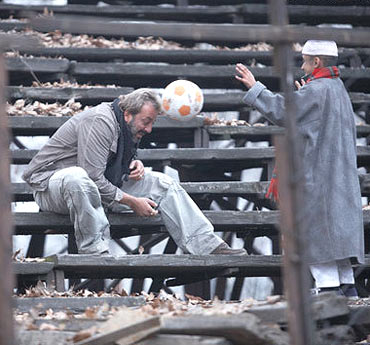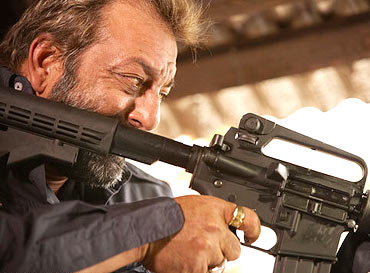 | « Back to article | Print this article |
'I want to tell Kashmiris we love you'
In his previous film, Parzania, Dholakia captured the 2002 Gujarat riots as seen through the eyes of a Parsi family.
This Friday, he hopes to capture the unrest in Kashmir in his new film, Lamhaa, starring Sanjay Dutt, Anupam Kher, Bipasha Basu and Kunal Kapoor.
Dholakia spoke to Rediff.com's Syed Firdaus Ashraf about Lamhaa and the Kashmir issue.
Parzania was made in 2005 and released nationwide in 2007. Lamhaa will be out in 2010. Why this gap?
I was not ready with any script post Parzania. In fact, I did two years of research and only then started shooting for Lamhaa.
You are tackling terrorism in Kashmir in Lamhaa. Why do you like to take up controversial subjects?
I like to tell stories that are real. When you say something true, it becomes controversial. It's not that I desire controversy; it's just that I want to tell the truth.
And if you have to tell the truth, you need to do research and get your facts right. And once you do research, you come through so many stories that have not been told. People don't like to hear the truth in such situations but that is a risk we (filmmakers) take.
But you need money to make such films.
Parzania was not made with money; it was made with heart.
For Lamhaa, we have stars to back it up like Sanjay Dutt, Bipasha Basu and Kunal Kapoor. We have tried to blend it in commercially, so that producers are also happy.
'Kashmir is a beautiful prison'
I was screening Parzania at a festival and met some Kashmiri students there. They told me Kashmir is a beautiful prison. That intrigued me.
They talked to me about a concept I had never heard of. So I told myself let me go to Kashmir and find out for myself. When I went there, I got the subject for Lamhaa.
What message do you hope to send out through this film?
Kashmir is a beautiful place and the people are very warm there. There is a big issue of identity in Kashmir and I think that needs to be addressed first. There is a song in my film, Main Kaun Ho, which is very apt for the valley.
Why do you think India has been unable to solve the Kashmir problem?
I think we have not found a solution because nobody wants to solve the problem -- whether it is the powers in Kashmir or the powers on the other side of the border.
Honestly, we should not bother about Pakistan because it is an issue for India. Nobody wants to solve the problem because it suits them. And it is the minority community that is suffering.
We have not been able to solve the problems of the Kashmiri Pandits who live in 4 by 4 tents. I have visited their camps. They live in miserable conditions.
How can we solve the problem of Kashmir?
We need to address the issues; we need to be open about it.
If you do a film on Kashmir and then censor it, how will you solve the problem?
We need to be straightforward and take the common man into confidence.
'War is the biggest business'
Absolutely. War is the biggest business in the world. How we interpret it is up to us.
Are you trying to become the Michael Moore of India (the American director best known for his acclaimed documentary Fahrenheit 9/11, which attacks the Bush administration after the 9/11 attacks)?
No. Look at the Iraq or Afghanistan issue. It just goes on and on. In 1979, the Russia-Afghanistan war was funded by the CIA. Later, people went on attacking Iraq and when it suited them, Iran became the enemy.
It's the same thing all over the world, not just in India. But India is a very peaceful country.
What message do you want to give the Kashmiris, and India at large?
I want to tell the Kashmiris we love you, that they are great and very hospitable.
I want the people of India to be open-minded and put themselves in place of the Kashmiri common man, not politicians.
They are human beings just like us. I want to spread the message of peace and love.
How do you talk to someone who doesn't want to be a part of India?
You are wrong. Kashmiris don't have a problem with Indians. They have a problem with the Indian authorities.
Let me ask you a question. If you have the armed forces in your face 24x7, where you are constantly asked for identification, how would you like it?
How would you like it if the prime minister comes to your city and your mobile phones get jammed?
Look at the jawans. They are in a miserable state as well. They don't know who will shoot at them and when. And how much are they paid? Rs 7,000 a month.
You are talking about the prime minister's recent visit to Srinagar, but then you have to take into account the threat from Lashkar-e-Tayiba terrorists. Isn't it a security concern?
Lashkar happens all the time. Don't you think you should get your act together before that?
Lashkar has been prominent for such a long time. What are we doing to stop that? Where is our intelligence?
If your intelligence is so smart, why did 26/11 happen? Why did Kargil happen?
'It will be very difficult for this generation to accept India'
There used to be communal harmony between Kashmiri Muslims and Kashmiri Pandits before militancy erupted. But that has disappeared now. There is no secular bonding any more.
Don't you think it will take a long time for them to trust each other again?
Sure. But we need to talk and be open about everything. The minute we get prejudiced, things will not happen.
Kashmiri Pandits have gone through horrible times, so it is difficult for them to go back to the valley. But we need to create a warm situation for them as well.
We should have at least given them re-establishment in the valley.
But they left because of the genocide of the Kashmiri Pandits by Kashmiri militants.
Agreed. But in 1947, when Pakistan attacked, it was the Kashmiri Muslims who stood by the Pandits and protected them.
All of us know what happened in the 1990s, how militancy started. Pakistan trained people, channeled in arms and mercenaries. It was the backlash of the Afghan war. A lot of ammunition and money was available.
Now we need to make things better by healing the wounds.
How do you talk to these leaders who are not willing to work within the framework of the Constitution?
Who are you talking about? Are you talking about Gilani (Hurriyat Conference hardline leader Syed Shah Gilani)?
The Mirwaiz (Hurriyat Conference moderate leader Mirwaiz Omar Farooq, who is also the spiritual leader of Kashmiri Muslims) is very liberal.
First of all, you need to remove the army. And my dear friend, you are talking about Indian Kashmir and Pakistan occupied Kashmir. Why does no one talk about China occupied Kashmir?
Do you mean Aksai Chin?
Yes. We still show that in our maps.
There was a generation in the 1990s when youngsters like Yasin Malik took to the gun and went against India. Twenty years later, we have a new generation. Why can't India win over this generation?
It's difficult. They have seen an entire generation hating India. They have not seen anything except hate.
The worst things to happen to Kashmir are the Ikhwanis -- they are militant-turned-protectors or police. They create more terror.
So it will be very difficult for this generation to accept India. Similarly, our generation also feels that Kashmiri means anti-India. But they are not anti-India.
If you were made chief minister of Kashmir, what are the three things you would do?
Resign, Resign and resign (laughs).
On a serious note, I would be open and talk to the people. I would build confidence in them. Employment, removal of army and peace.
'Sanjay Dutt is very fond of Kashmir'
No yaar. I am not taking on the government. I am a very pro-humanity kind of a person.
On the contrary, my hero is from Indian military intelligence. It is not an anti-government or anti-Indian film. It is a pro-Indian film and a pro-Kashmir film.
Coming back to Lamhaa, how did you convince Sanjay Dutt to star in it?
He liked the story and is very fond of Kashmir. That's why he agreed to do the film.
He plays a military intelligence officer who comes to the valley to uncover a terrorist plot.
What is Bipasha's role?
Bipasha plays a young Kashmiri girl who has a certain point of view. But that changes in the course of the film. Kunal plays a young rebel. He has trained in Pakistan, and is now fighting for elections in Kashmir. He wants a different kind of freedom for Kashmir.
Will you do only these kinds of movies?
I have made a film called Society. It is a satire.
I am also working on a court room drama that will take on the legal system.
Why not romantic films?
I made a romantic film called Kehta Hai Dil Baar Baar. Nobody met anybody after that (laughs). It's just that I am not in a romantic mood right now.
You took a long time to take up film direction.
Yes. I was doing lot of ad films. Then one day I decided to direct a film. It took me 15 years to make a film.
